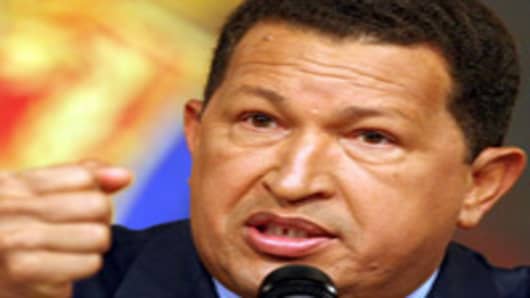But legalizing this power is bound to increase the unease of the business community, especially foreign investors who like established rules, and where the U.S. government has limited influence.
One irony of the deeply antagonistic relationship between the U.S. and Venezuela is their economies’ mutual dependence, which has actually grown in recent years.
Venezuela supplies about 11% of all U.S. imports of crude oil and petroleum products but as Venezuela’s oil production has declined, due to a lack of reinvestment, a greater percentage is now shipped to the U.S. -– more than 60% of its total exports.
Despite bilateral tensions – including threats from Chavez to stop exports to the U.S. or to close the five wholly-owned refineries Caracas owns in the U.S. - there has been no interruption of supply and none is anticipated because of the extreme economic pain it would inflict on both economies.
The level of concern about Chavez’s latest move depends on whether it is seen as ideologically driven, as another step towards socialism, or a more pragmatic consolidation of power.
Despite Chavez’s fiery, revolutionary rhetoric assertion of state control over the private sector has, so far been “selective and sporadic, not systematic,” says Michael Shifter of the Washington-based Inter-American Dialogue.
“This is a guy on a mission to accumulate as much power (as possible) and I don’t think he is going to disturb the private sector as long as it serves his political interests,” says Shifter, noting that a sizeable portion of the Venezuelan private sector has made an accommodation with Chavez.
But that’s been a matter of increasing necessity as the state has inserted itself more and more into the economy, including strict price controls, which have been popular with the masses so far, but which are to blame for shortages of a growing range of basic items, including milk, eggs and toilet paper.
Flush with petrodollars, Venezuela has enjoyed strong growth of about 10% in the last three years but populist economic policies -- including heavy government spending, lax monetary policy, and price controls –- are now coming home to roost in the form of 20% inflation.
The official foreign exchange rate overvalues the Venezuelan currency by some 300%.
Economists say that the longer the government delays correcting that, as well as other economic and fiscal oddities, the more painful the adjustment will be.
Chavez has said he would slow down the socialist transformation of country if he loses the referendum but he is considered unpredictable.
If he succeeds, Chavez will almost be politically unassailable even though his populist economic policies are unsustainable.




